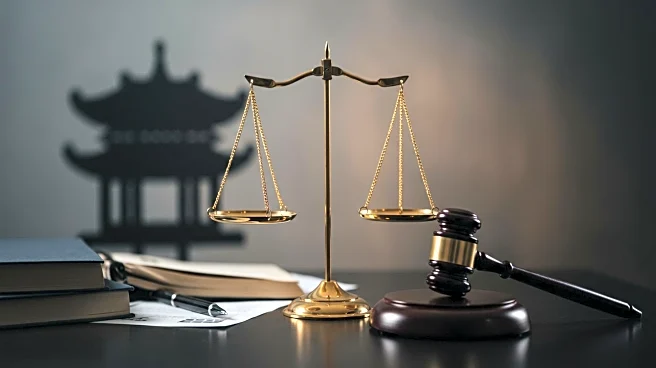What is the story about?
What's Happening?
Over 10,000 South Korean citizens are preparing to file a lawsuit against former President Yoon Suk Yeol and his wife, Kim Keon Hee, alleging psychological harm due to the martial law declaration on December 3, 2024. The lawsuit, which will be filed with the Seoul Central District Court, seeks damages of 100,000 won ($72) per plaintiff. The plaintiffs claim that the martial law was a deliberate act to violate their basic rights and obstruct a special counsel investigation into Kim Keon Hee. They argue that Kim actively participated in the alleged insurrection, making her a joint tortfeasor under civil law. The lawsuit also accuses the former president of abusing emergency powers to destroy evidence related to the Myeong Tae-kyun scandal.
Why It's Important?
This lawsuit represents a significant legal challenge to the actions of a former South Korean president and highlights the ongoing political tensions in the country. The case could have implications for the accountability of political leaders and the protection of civil rights in South Korea. If successful, it may set a precedent for holding leaders accountable for actions perceived as abuses of power. The lawsuit also underscores the public's demand for transparency and justice in political affairs, potentially influencing future governance and legal standards in South Korea.
What's Next?
The Seoul Central District Court will review the complaint and determine the next steps in the legal proceedings. The outcome of this case could influence public opinion and political dynamics in South Korea. Former President Yoon has already appealed a previous ruling in favor of 104 plaintiffs, and the court granted a temporary suspension of execution. The legal battle is likely to continue, with potential implications for Yoon's political legacy and the broader political landscape in South Korea.
Beyond the Headlines
The lawsuit raises questions about the ethical responsibilities of political leaders and the impact of martial law on civil liberties. It also highlights the role of legal systems in addressing grievances against powerful figures. The case may prompt discussions on the balance between national security measures and individual rights, as well as the mechanisms for redress in cases of alleged governmental overreach.















